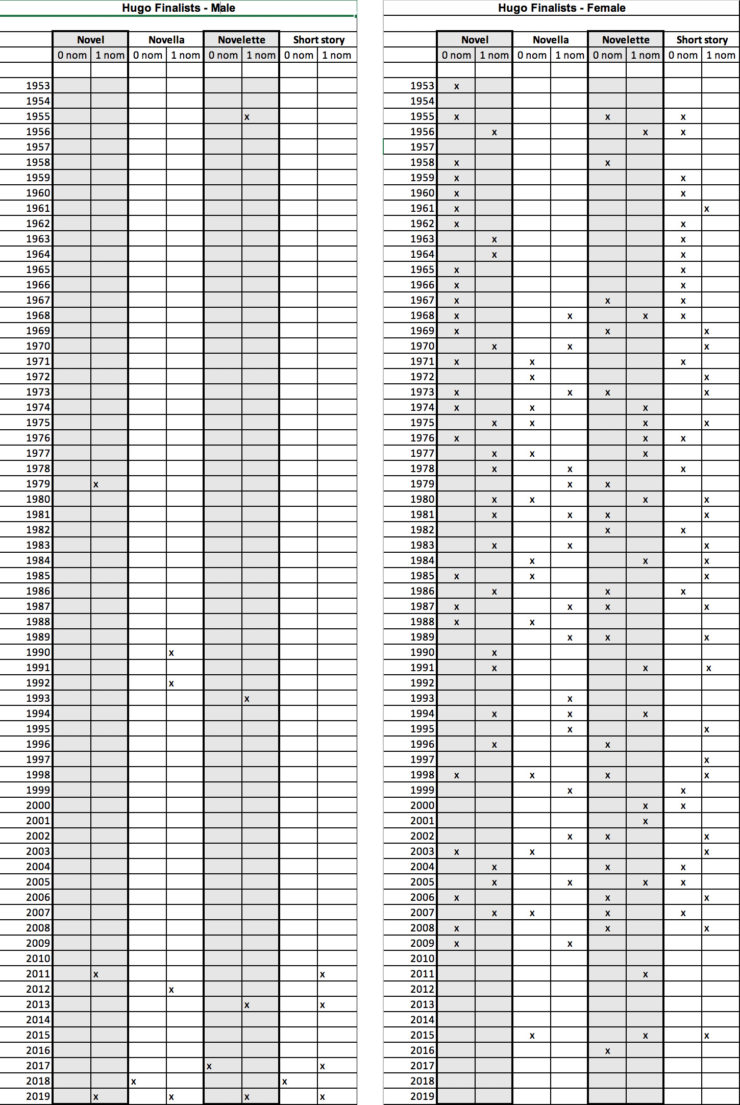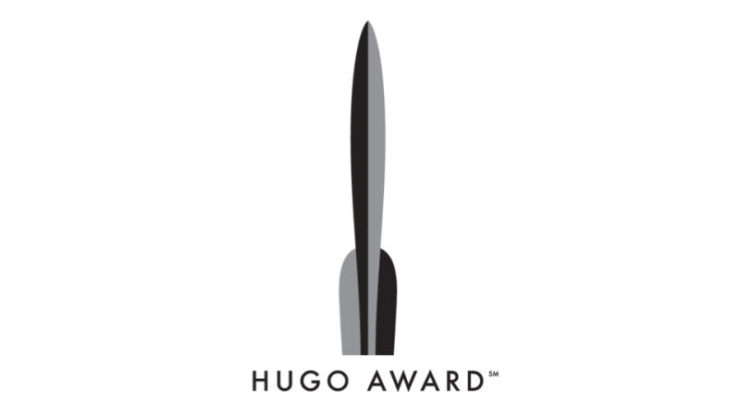When I heard people were apparently upset about the gender balance of this year’s Hugo winners, I thought I could give the records a quick eyeball and fill the empty abyss of daily existence for a short time establish once and for all whether or not this year was particularly atypical. If there’s one thing known about human nature, it is that concrete numbers resolve all arguments.
Because I don’t want to offend any gods that are lurking about with the sin of excessive perfection, I only looked at the prose fiction categories. Still, even a quick perusal reveals an astounding trend.
The longer data sets are in the end note (because I am pretty sure a footnote of that length would break Tor.com’s footnote system). Here is the Coles Notes version:
Of 65 years in which the Best Novel Hugos were issued, 45 (69%) had finalist ballots significantly skewed in a particular direction. Of 52 years in which the Best Novella Hugos were issued, 36 (69%) had finalist ballots significantly skewed in a particular direction. Of the 54 years in which Best Novelette was offered, 40 (74%) saw finalist ballots dominated by a particular gender. Of the 64 years in which a Hugo for Best Short Story was offered, 50 (78%) saw finalists predominantly of a particular gender.
For some reason, which I do not have time to pursue at this time, Hugo ballots almost never had comparable numbers of men and women. How pronounced this was varies from decade to decade but the trend is quite consistent.
It’s rather odd, therefore, that would be much fuss over gender balance in this particular year rather than some previous year, since until now people seemed perfectly happy with ballots dominated by one gender or the other. No doubt some subtle factor has changed… some esoteric element my quick perusal of the records failed to reveal. Perhaps it is as simple as a sudden embrace of egalitarianism! Feel free to offer other explanations in comments.
End Note One; or the lengthy bean counting section.
First, a couple of disclaimers: I am going to say “finalists” over and over but we only have the identity of the winners from the first few years of the Hugos. As well, the Hugos are a living tree: categories change from year to year and not all of the fiction categories have had awards every year the Hugos were handed out. Oh, and if a single person had multiple works nominated, they get counted for each nomination. Books written by a man and a woman would count as a book by a woman and a book by a man. And I’m not including the Retro-Hugos. Also, see footnote 1.

Best Novel
Years in which no or only one novel by a woman was nominated for the Best Hugo:
- 1953
- 1955
- 1956
- 1958
- 1959
- 1960
- 1961
- 1962
- 1963
- 1964
- 1965
- 1966
- 1967
- 1968
- 1969
- 1970
- 1971
- 1973
- 1974
- 1975
- 1976
- 1977
- 1978
- 1980
- 1981
- 1983
- 1985
- 1986
- 1987
- 1988
- 1990
- 1991
- 1994
- 1996
- 1998
- 2003
- 2004
- 2005
- 2006
- 2007
- 2008
- 2009
Years in which no novels by men were nominated for the Best Novel Hugo:
None that I can see.
Years in which only one novel by a man was nominated for the Best Novel Hugo:
- 1979
- 2011
- 2019
Of 65 years in which the Best Novel Hugos were issued, 45 had finalist ballots significantly skewed in a particular direction.
Best Novella
Best Novella Hugo Awards have been given out since 1968.
Years in which no women or only one woman was nominated for Best Novella:
- 1968
- 1969
- 1970
- 1971
- 1972
- 1973
- 1974
- 1975
- 1977
- 1978
- 1979
- 1980
- 1981
- 1983
- 1984
- 1985
- 1987
- 1988
- 1989
- 1993
- 1994
- 1995
- 1998
- 1999
- 2002
- 2003
- 2005
- 2007
- 2009
- 2015
Years in which no or only one novella by a man (solo or collab) was nominated for the Best Novella Hugo:
- 1990
- 1992
- 2012
- 2018
- 2019
If we combine years where very few women or very few men were nominated, we get 36 years of 52 in which one gender was more represented than the other.
Best Novelette
From Wikipedia: “The Hugo Award for Best Novelette was first awarded in 1955, and was subsequently awarded in 1956, 1958, and 1959, lapsing in 1960. The category was reinstated for 1967 through 1969, before lapsing again in 1970; after returning in 1973, it has remained to date.”
Years in which no or only one story by women was nominated for Best Novelette:
- 1955
- 1956
- 1958
- 1967
- 1968
- 1969
- 1973
- 1974
- 1975
- 1976
- 1977
- 1979
- 1980
- 1981
- 1982
- 1984
- 1986
- 1987
- 1989
- 1991
- 1994
- 1996
- 1998
- 2000
- 2001
- 2002
- 2004
- 2005
- 2006
- 2007
- 2008
- 2009
- 2011
- 2015
- 2016
Years in which no or only one novelette by men was nominated for Best Novelette:
- 1955
- 1993
- 2013
- 2017
- 2019
Of the 54 years in which Best Novelette was offered, 40 saw finalists predominantly of a particular gender.
Short Stories
Years in which no or only one story by women was nominated for a Hugo for Best Short Story:
- 1955
- 1956
- 1959
- 1960
- 1961
- 1962
- 1963
- 1964
- 1965
- 1966
- 1967
- 1968
- 1969
- 1970
- 1971
- 1972
- 1973
- 1975
- 1976
- 1977
- 1978
- 1980
- 1981
- 1982
- 1983
- 1984
- 1985
- 1986
- 1987
- 1989
- 1991
- 1995
- 1997
- 1998
- 1999
- 2000
- 2001
- 2002
- 2003
- 2004
- 2005
- 2006,
- 2007
- 2008
- 2015
Years in which no or only one story by men was nominated for Best Short Story:
- 2011
- 2013
- 2017
- 2018
- 2019
Of the 64 years in which a Hugo for Best Short Story was offered, 50 saw finalists predominantly of a particular gender.
In the words of Wikipedia editor TexasAndroid, prolific book reviewer and perennial Darwin Award nominee James Davis Nicoll is of “questionable notability.” His work has appeared in Publishers Weekly and Romantic Times as well as on his own websites, James Nicoll Reviews and Young People Read Old SFF (where he is assisted by editor Karen Lofstrom and web person Adrienne L. Travis). He was a finalist for the 2019 Best Fan Writer Hugo Award, and is surprisingly flammable.










